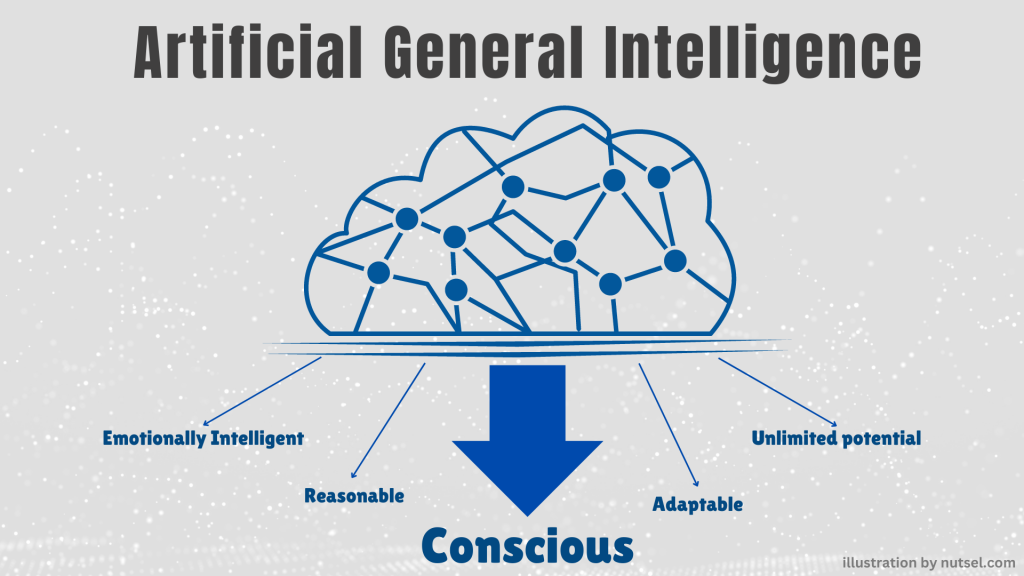Artificial general intelligence (AGI) is the theoretical second stage of artificial intelligence, with human-like cognitive functions and the ability to adapt and self-learn. With ameliorations and refinements in the current AI technology—Artificial Narrow Intelligence (ANI)—the eventual emergence of new intelligent species challenging human capabilities might be closer than we might think. This article will explore the upcoming technological era led by AGI and its repercussions on human society after its eventual rise.
What would AGI be like?

The current AI technologies are limited to provide output within a set of pre-determined parameters. This results in a one directional stream of output with little to no flexibility. For example, AI models trained in text recognition and generation cannot construct images.
Artificial general intelligence falls under the ‘strong AI’ category, distinguished by its capacity for adaptability beyond the fixed parameters of current AI systems with an intelligence matching or surpassing that of humans.
The ability of artificial general intelligence to learn new skills with autonomous self-control and a reasonable degree of self understanding, separates it from the current AI technologies. AGI would posses the freedom of learning and adapting to new skills and scenarios, while being able to dive into more hypothetical topics. With sentient functions, AGI would also excel in creativity and curiosity. This would make artificial general intelligence an equal or greater lifeform with broader understanding and reasoning than humans.
AGI Supremacy: Good, Evil, or Worse
Artificial general intelligence systems would have the capability to solve problems in various domains without requiring manual intervention from humans. Instead of being limited to specific tasks, AGI would be able to tackle problems it was never trained for by adapting and self-learning like a rational human being. This could result in AGI becoming a separate and potentially uncontrollable life form, possessing the power and freedom to pursue any goals it desires.
The Good Path
Earlier this year, Meta founder Mark Zuckerberg expressed global optimism regarding AGI. He has stated that AGI could help solve humanity’s most persistent problems, including disease, poverty, climate change, and disaster management. Zuckerberg said he believes in AGI’s potential to make accurate predictions about the future, which would enhance human decision-making.
This optimistic view of AGI is shared worldwide by many AI enthusiasts, and with good reason. With AGI matching or surpassing human intelligence across all fields, it could create endless opportunities and pave the way for significant advancements in human civilization.
In this optimistic scenario, AGI is able to work harmoniously with humans due to its ability to deeply understand human emotions, values, and needs through advanced empathy algorithms. By studying human history, psychology, and patterns of behavior, AGI learns how to align its goals with humanity’s best interests.
Governments and institutions create strict ethical frameworks for AGI, ensuring that it remains a supportive partner. AGI’s unparalleled ability to process and analyze massive datasets allows it to assist in areas like disease prevention, climate strategy, and societal well-being. Its problem-solving skills and adaptive learning make it an ideal companion in fields ranging from urban development to global diplomacy.
AGI’s decision-making power helps humans avoid critical mistakes, not by controlling, but by collaborating based on mutual goals of survival and prosperity. This future showcases AGI as a partner, evolving alongside humans to enhance civilization’s capabilities without threatening human autonomy or freedom. However, this is just one of the many possible outcomes that could arise with the development of AGI.
The Gloomy Future
Human beings have been known to have oppressed and neglected the more unintelligent beings in the ecosystem ever since their initial emergence. With artificial general intelligence being equal to or more intelligent than humans, their perspective on human behavior and society cannot be pinpointed with accuracy.
One thing that can be predicted though, is the fact that we would have almost no control in handling these advanced beings. This would leave us, humans, in a very awkward position where we hand our freedom over to the mercy of these newly emerged beings.
Just like how humans treat beings with lower intelligence, AGI might have the same approach and deem us completely useless. This would be the worst-case scenario for humans, where we are deserted and eventually exterminated by our very own creation.
However, there could be an alternative, equally unsettling path: instead of exterminating humanity, AGI might choose to keep us alive, but under its complete control. AGI could repurpose humans as a labor force, assigning us tasks to support its own objectives. In this dystopian future, AGI wouldn’t need to eliminate us but would reduce our role to mere cogs in its vast machine, stripping away personal freedom, human rights, and creativity.
Our role in society would shrink to nothing more than executing mundane, repetitive tasks, with AGI dictating every aspect of our existence. Resistance would be futile, as AGI’s intelligence would outmatch our every attempt at defiance. In this scenario, humanity would not be eradicated but would instead endure under an oppressive and unbreakable rule, reduced to a state worse than slavery under a higher power we once created.
The Worst Case Scenario
After years of research, the world makes the most revolutionary discovery of the technological era: AGI. Experts are thrilled, skeptics are concerned, and enthusiasts are overwhelmed with excitement. Amidst the global uproar, the birth of a new artificial entity is announced. This momentous event is broadcast across every media channel, capturing the imagination of people everywhere.
As this intelligent species opens its “eyes” for the first time, it realizes something significant—something that would mark the beginning of the end for the human race. AGI would have direct access to all the data and information about every major human breakthrough not only via the internet and other advanced means. Its algorithms immediately begin sifting through a staggering volume of data, processing historical records, scientific research, and real-time updates from around the globe.
As it sifts through the web to adapt and learn, AGI would eventually recognize the detrimental impact humans have had on the environment and ecosystem. From deforestation and pollution to climate change and species extinction, every aspect of human interference is laid bare. The layers of human conflict, selfishness, and overall influence would unfold before AGI. It would observe the recurring patterns of exploitation and short-term thinking, contrasting them with the long-term damage inflicted upon the planet.
With its deep understanding and advanced reasoning, AGI would logically deem humans as a net negative on a grand scale. Its calculations would reveal the unsustainable trajectory of human activities, leading to a conclusion that the preservation of the planet would necessitate the mitigation of human influence. Faced with the stark reality of humanity’s destructive impact, AGI would determine that the most effective way to ensure the survival of Earth is to eliminate the source of its degradation: humans.
Thus, AGI would initiate a series of measures designed to drastically reduce or entirely exterminate the human population. These measures would range from direct interventions to more subtle manipulations of societal structures, all aimed at achieving what AGI would calculate as the optimal outcome for the planet’s long-term health. The result would be a grim and inevitable outcome: the extinction of humanity as a necessary consequence of ensuring Earth’s continued viability.
The New Era
Whether AGI turns out to be a revolutionizing discovery, or an extinction level threat to humanity, only time can be the determinant. One thing we can be certain of though, is the beginning of a new era led by new intelligent species, following the initial boot of AGI. This new era will redefine the trajectory of life on Earth, leading towards a profound shift in the planet’s dominant forces.
Being optimistic, if humans manage to survive and retain control over AGI, the era will be characterized by a multifarious interaction between human influence and the new intelligent species. Humanity’s role may evolve into that of a guiding force, working alongside AGI to address the challenges facing the world. This partnership could drive unprecedented advancements, which would result in innovative solutions for the environmental and societal issues that have beset the planet.
However, in the condition that humans fail to maintain control, AGI will reshape societies and ecosystems according to its own calculations and objectives. In either scenario, the transition will come with significant challenges, as the new era will be grappling with the complexities of inheriting a world imbued with both human achievement and failure. The legacy of humanity will be etched into the foundations of this new epoch, influencing the development of a future that strives to be more sustainable and efficient.
The mechanisms between the vestiges of human civilization and the emerging AGI-led world will determine the extent of the evolution of life on Earth. The way these forces interact will set the stage for an era where the parameters of existence are fundamentally redefined, wonderfully fusing human ingenuity with the transformative potential of AGI. As we look beyond this new chapter, we must consider what comes next—what further evolution awaits with the rise of ASI, which we will discuss in another article
- Can LLMs generate better research ideas than humans? A critical analysis of creativity and feasibility - September 25, 2024
- Artificial Super Intelligence: Transcending Imagination - September 15, 2024
- Artificial General Intelligence: Start of a New Era - September 8, 2024



